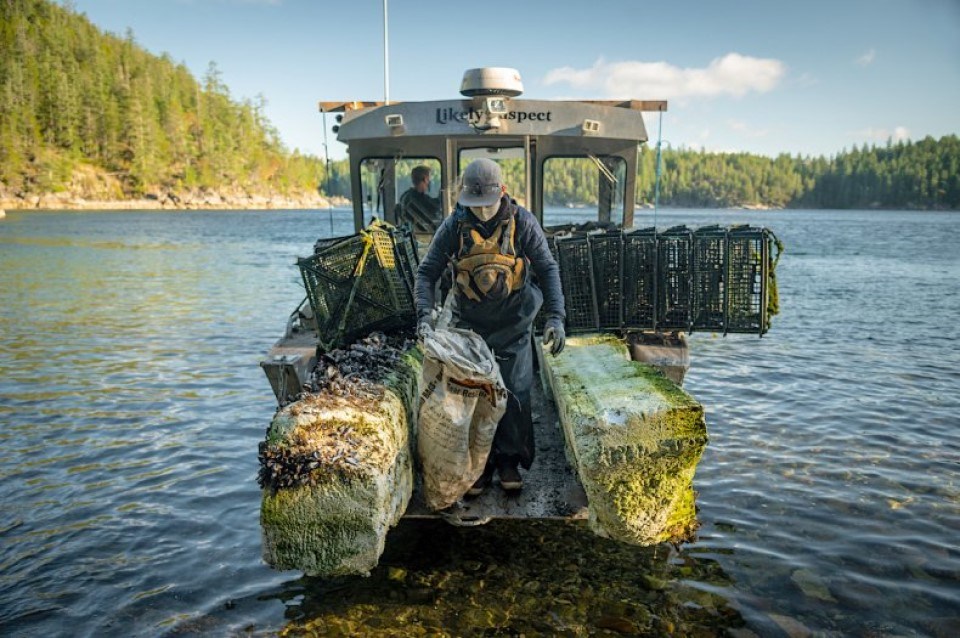A West Coast cleanup project wrapped up operations in time for Christmas after removing 50 tonnes of marine debris from the shores of B.C.'s Discovery Islands.
The amount of garbage collected by a small but determined team from 357 kilometres of shoreline on Quadra, Cortes, Read, Maurelle, and Marina islands from October to late December was staggering, said project co-ordinator Breanne Quesnel.
“We’re really proud we were able to help get that volume of material off the beaches,” said Quesnel, co-owner of Spirit of the West Adventures, the wilderness tourism company that secured the provincial funds to do the cleanup.
“But we’re really disheartened that it's there in the first place.”
Plastic waste from shellfish farms and other aquaculture operations, as well as commercial fishing ropes and nets, made up the bulk of the garbage collected, Quesnel said.
Other ubiquitous offenders were large blocks of Styrofoam and tires typically used to float docks or for mooring devices, she said.
The Styrofoam, or polystyrene plastic, is particularly bad because as it degrades and crumbles, the small, lightweight bits are easily and widely dispersed by wind and waves, Quesnel said. And they are almost impossible to collect, she added.
The cleanup crews also found a number of partially filled and leaking oil drums that needed to be carefully disposed of.
The focus of the operation was to get the largest, most difficult to remove items from more remote beaches, which required specialized transport on land and water, she said.
The largest item by far was a massive 6,000-pound tire, most likely from a mining vehicle, that required two cranes to lift onto the dock and a specialized vehicle to take it away.
The goal was also to collect items that would degrade into microplastics and cause havoc in the marine food web, Quesnel said.
Though much of the bigger debris items on island shores came from marine industries, a lot of consumer items are finding their way into the ocean, too.
“We found more than 200 shoes,” she said.
Quesnel’s pet peeves are all the plastic tampon applicators, straws, plastic dental floss picks, shotgun shell casings, plastic bags and Starbucks stir sticks littering island beaches.
“Anyone who has ever used a plastic tampon applicator should have to spend a day or a week cleaning up a beach … because those are just plentiful.”
The fact so much plastic debris is still being found on the shores of Quadra demonstrates how pervasive the problem of plastic marine debris is, Quesnel said.
The recent intensive shore sweep follows years of dedicated effort by Quadra residents who conduct an annual community beach cleanup, except the past two years because of the pandemic.
And island volunteers constantly walk the beaches and pick up plastic. But the waves of detritus continue, even on the most recently cleaned beaches, Quesnel said.
While beach cleanups are important and need to continue beyond being a COVID-19 relief measure, any real resolution involves choking off plastic use, she said.
There needs to be much stricter policy from all levels of government around plastic production and use, and more responsibility from industries that use them, Quesnel said.
“There needs to be better systems in place for tracking those materials and accountability for where they're coming from,” she said.
“And we need to be smarter about what we're using, how we're using it, what its life cycle is.”
Plastic pollution in aquatic ecosystems across the globe has grown sharply in recent years and is anticipated to more than double by 2030, according to a recent report by the UN Environmental Program.
Plastic accounts for 85 per cent of marine debris, and 23 million metric tonnes to 37 million metric tonnes of plastic will pollute the ocean per year by 2040 — which translates to 50 kilograms of plastic per metre of coastline worldwide with dire implications for human health, biodiversity, and the climate and global economy, the report said.
Canada spearheaded an international effort to reduce plastics in marine ecosystems with the 2018 Oceans Plastic Charter. But the accord is voluntary and not enough to meet the severity of the problem plastics pose, experts suggest.
Ottawa has said it is supportive of current negotiations for a global treaty to mandate change for the entire life cycle of plastic, including its production, use, and disposal.
The initiative is slated for discussion at a UN environmental assembly in February, but the federal government hasn’t clarified support for any specific measures or whether it would support a legally binding agreement.
Quesnel said that one of the most positive aspects of the Discovery Islands beach cleanup was that 50 per cent of the garbage collected was diverted from landfills through recycling or reuse.
“That's why it was so labour-intensive,” she said.
“Every piece that we picked up off of a beach came back to our yard and was dumped onto a tarp and sorted into one of 16 categories for recycling.”
The cleanup was funded by the province’s $18-million Clean Coast, Clean Waters initiative, and is one of nine similar projects across much of the coast.
More than 550 tonnes of garbage has been removed from coastal shores and created employment during the pandemic, according to the B.C. Ministry of Environment.
Aside from protecting marine ecosystems, Quesnel said the coastal cleanup initiative is important given much of the local economy, her marine tourism business included, relies on keeping plastics out of the ocean.
The islands, sandwiched between the B.C. mainland and eastern Vancouver Island, are known for their beauty and are a popular wilderness destination for kayakers, boaters and fishing enthusiasts, she said.
“We really appreciated working with the local youth, community and First Nations,” Quesnel said.
“But I’d rather not be cleaning up beaches, (I’d) rather be helping find better solutions for plastics and debris before they become a problem.”
Rochelle Baker, Local Journalism Initiative Reporter, Canada's National Observer



